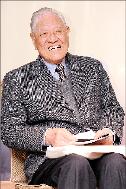Former president Lee Teng-hui (李登輝) yesterday said Taiwan should replace the Republic of China (ROC) Constitution with a new constitution that reflects modern realities.
Lee said the ROC Constitution, enacted in China in 1947, is not suitable for Taiwan and should be replaced by a Taiwan basic law and that ultimately a new constitution should be enacted.
Lee made the remarks during an event organized by Taiwan Advocates in Taipei with four academics who were representatives of a student movement in 1991 known as the Wild Lilies (野百合學運).

Photo: Chang Chia-ming, Taipei Times
Back then, Lee met the student representatives and accepted their four demands, which were that Lee dissolve the now defunct national assembly, abolish the Temporary Provisions Effective During the Period of Communist Rebellion (動員戡亂時期臨時條款), call a state affairs meeting and set a timetable for political and economic reforms.
Four of the representatives met Lee again yesterday and each asked the former president questions about constitutional reform, cross-strait relations and the intricate relationship between the Chinese Nationalist Party (KMT) and business consortiums.
On constitutional reform, Lee said the ROC Constitution was amended six times during his presidency. These amendments, collectively known as the Additional Articles (增修條文), ended the Temporary Provisions Effective During the Period of Communist Rebellion and gave “electors of the free area of the Republic of China” — consisting of Taiwan proper as well as the outlying islands of Penghu, Kinmen and Matsu — the right to vote on constitutional amendments.
“The ROC Constitution is like temporary housing where we have not much choice but to stay there because of Taiwan’s special situation,” he said.
Lee said how the ROC Constitution should be dealt with hinged on the good faith of future leaders and their belief in the country.
National identification was a key component building a -Taiwan-centered consciousness, he said.
With a Taiwan-centered orientation, many problems such as the economy, the Constitution or cross-strait relations would naturally be resolved, he said.
Thirteen years after Lee made his announcement of the “special state-to-state” theory in 1998, many things have changed, he said.
“Taiwan must be stronger and China must change,” he said. “One of the biggest differences between Taiwan and China is that Eastern and Western civilizations co-exist in Taiwan, but this is not the case in China.”
On the KMT’s much criticized close ties with big businesses, Lee said that back then the KMT was rich, with very substantial party assets.
Therefore, it was natural to play the leading role of an investor. Of course, there were advantages and disadvantages, he said.
Asked whether he would have done things different if he had a second chance, Lee said he saw things differently now.
It was true that the KMT was a profit-making business, but the private sector also benefited significantly from the booming economy, he said.

MAKING WAVES: China’s maritime militia could become a nontraditional threat in war, clogging up shipping lanes to prevent US or Japanese intervention, a report said About 1,900 Chinese ships flying flags of convenience and fishing vessels that participated in China’s military exercises around Taiwan last month and in January last year have been listed for monitoring, Coast Guard Administration (CGA) Deputy Director-General Hsieh Ching-chin (謝慶欽) said yesterday. Following amendments to the Commercial Port Act (商港法) and the Law of Ships (船舶法) last month, the CGA can designate possible berthing areas or deny ports of call for vessels suspected of loitering around areas where undersea cables can be accessed, Oceans Affairs Council Minister Kuan Bi-ling (管碧玲) said. The list of suspected ships, originally 300, had risen to about

DAREDEVIL: Honnold said it had always been a dream of his to climb Taipei 101, while a Netflix producer said the skyscraper was ‘a real icon of this country’ US climber Alex Honnold yesterday took on Taiwan’s tallest building, becoming the first person to scale Taipei 101 without a rope, harness or safety net. Hundreds of spectators gathered at the base of the 101-story skyscraper to watch Honnold, 40, embark on his daredevil feat, which was also broadcast live on Netflix. Dressed in a red T-shirt and yellow custom-made climbing shoes, Honnold swiftly moved up the southeast face of the glass and steel building. At one point, he stepped onto a platform midway up to wave down at fans and onlookers who were taking photos. People watching from inside

Japan’s strategic alliance with the US would collapse if Tokyo were to turn away from a conflict in Taiwan, Japanese Prime Minister Sanae Takaichi said yesterday, but distanced herself from previous comments that suggested a possible military response in such an event. Takaichi expressed her latest views on a nationally broadcast TV program late on Monday, where an opposition party leader criticized her for igniting tensions with China with the earlier remarks. Ties between Japan and China have sunk to the worst level in years after Takaichi said in November that a hypothetical Chinese attack on Taiwan could bring about a Japanese

The WHO ignored early COVID-19 warnings from Taiwan, US Deputy Secretary of Health and Human Services Jim O’Neill said on Friday, as part of justification for Washington withdrawing from the global health body. US Secretary of State Marco Rubio on Thursday said that the US was pulling out of the UN agency, as it failed to fulfill its responsibilities during the COVID-19 pandemic. The WHO “ignored early COVID warnings from Taiwan in 2019 by pretending Taiwan did not exist, O’Neill wrote on X on Friday, Taiwan time. “It ignored rigorous science and promoted lockdowns.” The US will “continue international coordination on infectious